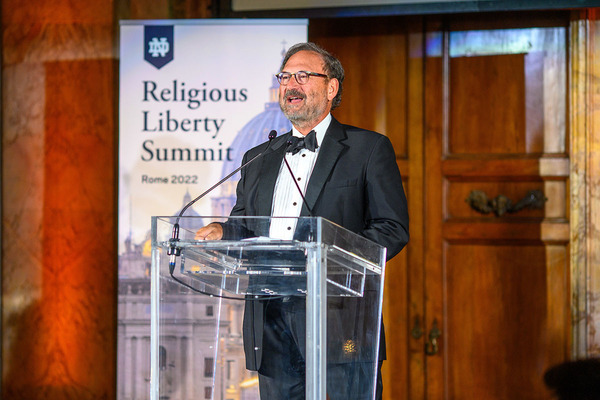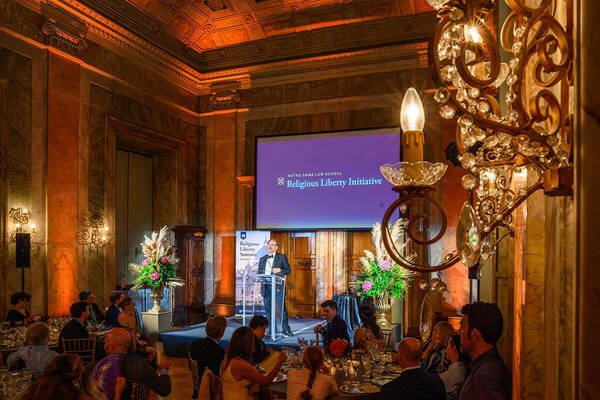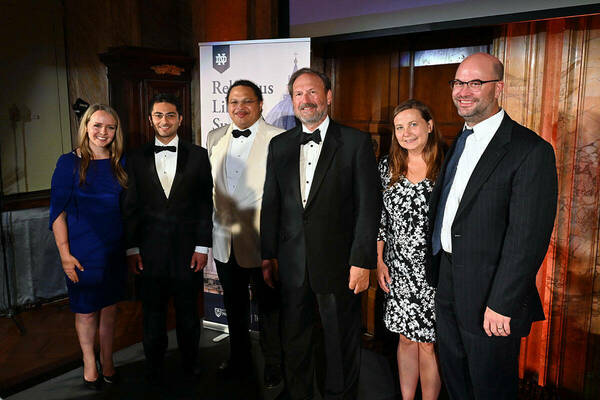
The Law School’s Religious Liberty Initiative hosted the 2022 Notre Dame Religious Liberty Summit in Rome last week to highlight that freedom of religion or belief is a global issue.
U.S. Supreme Court Justice Samuel Alito — who delivered the keynote address at the Religious Liberty Summit’s gala dinner on Thursday, July 21 — noted that the Roman setting also brought to mind how religious freedom has been challenged and championed throughout history.
“I find myself thinking about the proud civilization that was centered here two millennia ago,” Alito said near the beginning of his remarks.
“As I think back, I also think ahead, and I wonder what historians may say centuries from now about the contribution of the United States to world civilization,” he said. “One thing I hope they will say is that our country, after a lot of fits and starts, and ups and downs, eventually showed the world that it is possible to have a stable and successful society in which people of diverse faiths live and work together harmoniously and productively while still retaining their own beliefs. This has been truly an historic accomplishment.”

But, the justice added, as the remnants of the Roman Empire make clear throughout the city, no human achievement is ever permanent.
“Therefore, we can’t lightly assume that the religious liberty enjoyed today in the United States, in Europe, and in many other places will always endure. Religious liberty is fragile, and religious intolerance and persecution have been recurring features of human history,” he said.
Indeed, Rome is where St. Peter, St. Paul, and countless other early Christians were martyred.
“If we look around the world today, we see that people of many different faiths face persecution because of religion,” Alito said, noting that religious liberty is a life-or-death matter in many parts of the globe. He cited examples of groups such as the Yazidis in northern Iraq, Christians in Nigeria, Coptic Christians in Egypt, and Uyghurs in China that have been victims of horrific violence.
Alito also talked about the challenges that lie ahead for religious liberty around the world.
“Religious liberty is under attack in many places because it is dangerous to those who want to hold complete power,” he said. “It also probably grows out of something dark and deep in the human DNA — the tendency to distrust and dislike people who are not like ourselves.”
Another test is the growing number of people who reject religion or don’t think religion is important.

“It is hard to convince people that religious liberty is worth defending if they don’t think that religion is a good thing that deserves protection,” he said. “The challenge for those who want to protect religious liberty in the United States, Europe, and other similar places is to convince people who are not religious that religious liberty is worth special protection. That will not be easy to do.”
One way to find common ground with non-religious people on the topic of religious liberty, Alito said, is to emphasize the related benefits that societies enjoy when religious liberty is protected.
Religious liberty promotes domestic tranquility, he noted, and provides a way for diverse people to flourish together. Another benefit is the enormous charitable work done by religious groups and people of faith.
In addition, he said, religious liberty has often fueled social reform. Religious groups led the movement to abolish slavery in the United States and Europe, for example. And it’s no coincidence that Dr. Martin Luther King Jr. was an ordained minister.
“If religious liberty is protected, religious leaders and other men and women of faith will be able to speak out on social issues,” Alito said. “People with deep religious convictions may be less likely to succumb to dominating ideologies or trends, and more likely to act in accordance with what they see as true and right. Civil society can count on them as engines of reform.”
Finally, the justice described the strong relationship between religious liberty and other rights such as free speech and the freedom of assembly. “Religious liberty and other fundamental rights tend to go together,” he said.
At the end of his speech, Alito recounted a memorable conversation he had with a Peking University student. The young woman grew up in a Chinese town where, because of its history, several churches were located. The Catholic Church there was known as “the church that gave reasons,” she said.
“That really struck me,” Alito told the audience in Rome.
“The Cultural Revolution did its best to destroy religion, but it was not successful. It could not extinguish the religious impulse,” he said. “Our hearts are restless until we rest in God. And, therefore, the champions of religious liberty who go out as wise as serpents and as harmless as doves can expect to find hearts that are open to their message.”
Watch Justice Alito's full keynote address in the video below.
Learn more about Notre Dame Law School’s Religious Liberty Initiative at law.nd.edu/RLI.
Originally published by at law.nd.edu on July 28, 2022.